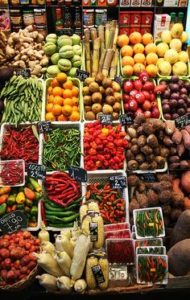
In addition, we walk or bike for miles. I have probably done more walking in biking in the last two years that in the last twenty when I lived in a house. That being said, staying in shape physically is not really an issue; living on a boat takes care of that. What is more important, is taking care of our insides.
One of the ways I can make a small bit of income while traveling around the world is by writing for a company called Textbroker. If I have access to the internet, I can take writing assignments. I get paid for each assignment and I can pick the topics I like to write about.
I recently wrote this article about gut health. I knew bits and pieces already about the importance of a healthy gut. After writing this article, I learned a lot and I think it is going to be crucial in keeping Dan and me healthy as we travel around the world. I thought I would share this as it is relevant to other liveaboards who have the desire to stay healthy and to everyone else that understands the importance of a good diet.
THE IMPORTANCE OF GUT HEALTH

Chances are if you haven’t been proactive in maintaining the mini-ecosystem living in your digestive tract, it probably could use some improvement. It turns out, research on gut health shows it can impact areas such as fat loss, systemic inflammation, depression, anxiety, skin conditions, and your immune system.
Now that we know a little about why gut bacteria is important, how do we make it healthy? You might be familiar with the yogurt commercials that advertise “good” bacteria known as probiotics. Probiotics are good but they are just the tip of the iceberg. There are many ways to improve your gut health and each person’s needs may vary.
Improving gut health has to be a conscious decision. Almost every facet of your health boils down to that invisible ecosystem in your belly that you probably haven’t given much thought about. With the rising rate of obesity, diabetes, and autoimmune diseases, now might be an important time to learn how to improve your gut health.
While taking supplements can be beneficial, simply adding probiotics blindly without addressing other issues isn’t the best solution. You can still eat the foods you love while building healthy gut bacteria. Let’s take a look at the basic functions of gut bacteria and practical ways to make it healthier. First and foremost, how do we determine our gut health?
Got Gut Health?
In the past, our digestive system was deemed a simple process. We had a long tube that our food passed through, got absorbed, and then excreted.
Now, gut health refers to the microorganisms living in your intestines. Each person has between 300 to 500 different species living in their gut. While some of these are harmful, many are very beneficial and necessary for overall health.
Based on the research of Dr. E.M. Quigley in his study on gut bacteria which was documented in the Journal of Gastroenterology and Hepatology, Healthline lists some of the symptoms that might mean you have an unhealthy gut.
1. Tummy troubles
Do you often have an upset stomach? If you commonly have stomach issues such as gas, bloating, diarrhea, constipation, and heartburn, these can be the signs of an unhealthy gut. When your gut is balanced, you will have less difficulty possessing and eliminating food.
2. Sugar addict
If you are overly sweet on the sweets, these sugars can decrease the number of good bacteria in your gut. The more imbalanced your gut, the more the sugar cravings will increase. High amounts of refined sugar and that “big no-no” high fructose corn syrup have been linked to systemic inflammation. Inflammation leads to many diseases including diabetes and cancer.
3. Weight gain yo-yo
If you are prone to gaining and losing weight when you haven’t made any changes to your diet or exercise regimen, this may be due to an imbalanced gut. This can impair your body’s ability to absorb nutrients, store fat, and regulate blood sugar levels. The science behind this is that when your body experiences small intestinal bacterial growth (SIBDO) you may experience weight loss. Weight gain can be triggered by insulin resistance. This creates a desire to overeat because of decreased nutrient absorption.
4. Sleep poorly, always tired
Yes. Even your sleep patterns can be related to gut health. If you suffer from sleep disturbances, insomnia, chronic fatigue, know that the hormone that affects mood and sleep is produced in your gut. A healthy gut equals better sleep and less fatigue.
5. Tired of the dermatologist
Did you know that certain skin conditions like eczema and acne can be related to bad gut conditions? A poor diet and or food allergies can cause “leaking” of proteins that irritate the skin and cause these conditions.
6. Immunity issues
Evidence is continually emerging on the impact of gut health on the immune system. When the body experiences systemic inflammation, this deters your immune system. A compromised immune system can lead to autoimmune diseases which is when the body attacks itself rather than the harmful bacteria.
7. Food intolerance
If certain foods are not your friend, this could be the result of a difficulty to digest them. Unlike a food allergy, which is an immune system reaction to foods, intolerance can be attributed to poor gut bacteria. If certain foods cause you to feel bloated, have excessive gas and diarrhea, abdominal pain or even nausea, this could simply be a matter of poor gut health.
The Road to a Healthy Gut
For a visual overview of how the food you eat affects your gut, and which foods to eat for good gut health, check out Shilpa Ravella’s short video on Youtube.
Food Revolution Network is a great resource for helping you understand why healing your gut is important and what foods to eat to make that happen.
Renown health expert Dr. David Perlmutter states that a person with healthy gut flora is a happy person. In order to you’re your digestive system working at its best and full of the right kind of bacteria, you need to think of the following three food categories: fiber, nutrient-dense foods, and fermented foods.
In case you are worried that you might have spent your lifetime eating food that may not have been good for you, you don’t need to worry about your current microbes, they can be reformed.
The type of food you eat will determine which bacteria are currently present in your gut. Research has determined that the good bacteria in your gut will get stronger when you eat certain foods. Let’s take a look at what those foods are – and which ones you will enjoy incorporating into your diet.
Probiotics and Prebiotics: Your Two New Best Friends
You’ve most likely heard of these terms as they have been touted as the beneficial good bugs. What you might not know is that you can get them by eating foods other than by popping a pill or eating yogurt.
Probiotics are present in fermented foods. Prebiotics can be found in many fruits, most vegetables, and whole grains. Fiber is a huge contributor to incorporation prebiotics into your diet.
Fabulous Fiber for Prebiotics
Only 3% of US citizens get the recommended amount of 40 grams of fiber per day. This is one of the most crucial ingredients for gut health. Let’s take a look at some of the important reasons to include more fiber in your diet:
-
Fiber is responsible for feeding the good bacteria. Eating fiber-rich foods extracts the fiber’s energy, vitamins, and nutrients. This results in improving your immune system, it decreases inflammation and prevents obesity.
-
Fiber assists in reducing inflammation of the intestine. It helps in relieving an extremely common digestive illness, diverticulitis. Easting foods rich in fiber can reduce the risk of diverticulitis by 40%.
-
Soluble fiber is what lowers blood glucose levels as well as LDL cholesterol. Insoluble fiber works to cleanse your digestive system. Both are actively working to improve your gut health.
Eating Well provides a list of fiber-rich foods as well as recipes to go along with them. Here are their top picks for getting your daily dose of fiber, and enjoying it.
Jerusalem Artichokes
Leeks
Onions
Raspberries
Beans
Asparagus
Garlic
Bananas
Pears
Watermelon
Fermented Foods – The Key to Probiotics
Think about the letter F when it comes to probiotics, fermented foods. Probiotics are created in food using a natural fermentation process. Yes, beer and wine are fermented, but we are not talking about alcohol.
Including fermented foods into your food repertoire may just be the key to achieving your healthy gut goals. They provide your gut with living microorganisms that take over the bad bacteria. They improve the body’s ability to absorb minerals and support good gut health.
Fermentation has been around for centuries. It was primarily used by our ancestors to preserve food. While we still use this process, because our diet has changed to include so much processed food and refined sugar, we need to get back to the basics and go with fermented food products.
Saurekraut – homemade is easy to make and has greater nutrient value. Fermented cabbage also is high in vitamin B which helps you absorb iron.
Fermented soy – has been in the human diet for hundreds of years. More stores are offering it on their shelves and you can find it on the menu in many restaurants. Chose organic if you can, and research some good recipes as it can be bitter or bland.
Kimchi – the alternative to sauerkraut and soy, is perfect for those looking to spice it up a little bit. This Korean dish often includes tasty spices such as onion, garlic, ginger, and curry powder. This is another tasty dish filled with probiotics and you can make your own.
Miso – is a Japanese dish made with bean paste. It is overflowing with good bacteria. Miso has been thought to assist with preventing cancer and may lower blood pressure. Miso is found in most grocery stores and can be used in hundreds of recipes.
Kefir – is the heavy-hitter in the probiotic world. It is the most probiotic-rich food on the planet. It can be found in grocery stores or you can make your own using nut milk if you are allergic to dairy. Try out this easy kefir recipe by the Petite Cook.
Pickles and sour vegetables – who doesn’t love a pickle and they are high in antioxidants and filled with great probiotics. Don’t stop with pickles. Almost any vegetable can be pickled. If you have a garden, try a simple recipe and make your own pickled veggie delights that will make your gut dance with joy.
Think Green for Your Gut
Your mother probably told you to eat your greens. She was right! Greens contain loads of minerals and can increase blood lipids. What is best about them is that they contain a fiber that boosts the great-for-you bacteria, bifidobacteria.
Renowned expert David Perlmutter, MD, has stated that by increasing bifidobacteria you can potentially reduce the number of damaging bacteria. This will assist with healthy bowel movements, and actually helping boost immune function.”
Since that is the goal, let’s look at some of the healthiest greens you can include on your journey to improve your gut health.
Dandelion greens are no longer just a weed. This super healthy green can be bitter but you can sauté them with onions, drink them as tea, or toss them into soup and salads. Just be careful if you are harvesting them on your own that you are not gathering them from an area sprayed with pesticides or lawn care products.
Broccoli is not only popular; it is great for the gut. A study by Functional Foods conducted in 2017 concluded that broccoli can improve intestinal health. In the same family, cauliflower, and vegetables like brussels sprouts, kale, cauliflower, and cabbage are great when eaten raw, steamed, or stir-fried. They are not only tasty but will contribute to a healthy level of gut probiotics.
Asparagus – is not only a great tasting veggie that’s rich in probiotics, but it also aids digestions. Like its cousin the dandelion green, asparagus is rich in inulin (a naturally occurring polysaccharide that is good for you). Besides adding to your good gut bacteria, it also can help with regularity and ease bloating.
Seaweed – not really a weed, it should be renamed sea-gem because it’s so rich in nutrients and fiber. Japanese women are known for their good gut bacteria as they tend to include seaweed regularly in their diets. Alginate is a substance in seaweed that can strengthen gut mucus and slow down digestion which makes food release energy more slowly (which is a good thing).
Jerusalem Artichoke – does good things for the gut. It is also known by other names such as sunchoke, earth apple, and sunroot. Touted as one of the best veggies for gut health it also contains inulin. British Nutrition Journals have documented that artichokes can increase Bifidobacterium and Lactobacillus. This can increase digestive activity so be careful when you introduce them into your diet. They can be cooked or eaten raw.
Jicama – the Mexican turnip, is not only sweet and crunchy but is also jam with fiber. A single cup of jicama eaten raw contains 6 grams of fiber, 15% of what you should be consuming daily. Jicama is also good for weight loss, blood sugar control, and it’s high in vitamin C. Try it in smoothies, salads, and stir-fry.
More Food Your Gut Will Love
Flaxseed is a tiny superpower for improving gut health. It contains the highest concentration of lignans (antioxidants that help prevent cancer) of any food known for humans. Flaxseed fuels that good gut flora. The soluble fiber found in these seeds can also improve your regularity.
You will be surprised how simple it is to incorporate flaxseed into your diet. Try ground flaxseed in smoothies or sprinkled on your salad. Try to choose freshly ground flaxseed or throw the seeds in a food processor and grind it yourself. Whole flax seeds tend to pass through the digestive system without being properly digested.
Please note that flaxseed flour can go rancid very quickly. You can prevent this by buying whole seeds and grinding them up on an “as needed” basis. You should store any flour you don’t use immediately in the fridge or freezer.
Garlic was probably a fan favorite before your quest for gut health. Great news for garlic lovers. While garlic is still the ultimate in food flavoring, it is also great for your gut health. Food and Science and Human Wellness completed a study in 2013 that found garlic boosted the production of good gut microbes and might help prevent gastrointestinal diseases.
A little-known superfood you may never have heard of, gum arabic is produced from the sap of the Acacia Tree. A 2008 study conducted by the Journal of Nutrition in Britain, discovered that gum arabic contains the beneficial strains of bacteria, Bifidobacteria and Lactobacilli. It is simple to add acacia fiber to your diet by drinking the powder with water. It can also be found in supplement form.
Go Bananas
Eating fruit is another healthy option for your gut. Most everyone has a favorite fruit so this should be an easy component to add to your gut improving regimen. Bananas, for instance, are great for restoring harmony in your gut’s ecosystem.
Some of the benefits of bananas are that they contain high levels of potassium and magnesium. These minerals can help reduce inflammation, benefit digestion, improve heart health and can even assist in weight loss. Not only that, they are delicious. Bananas not only contain a fair amount of fiber (118 grams for a medium size) but they also come power-packed with the following vitamins and minerals:
Potassium: 9% of the RDI
Vitamin B6: 33% of the RDI
Vitamin C: 11% of the RDI
Magnesium: 8% of the RDI
Copper: 10% of the RDI
Manganese: 14% of the RDI
Net carbs: 24 grams
Fiber: 3.1 grams
Protein: 1.3 grams
Fat: 0.4 grams
Apples are another easy fruit to add to your diet. They are high in fiber and green apples are known particularly for boosting good gut bacteria. Eat them as a snack or enjoy them stewed, or baked, filled with raisins and cinnamon. Chose organic when possible to reduce exposure to pesticides.
Are Probiotic Supplements Right for You
While probiotic supplements can assist in the treatment of irritable bowel syndrome (IBS), colitis, diarrhea, acne, and skin conditions, the evidence suggests this is a result of improving gut health. However, these supplements are not all the same and they don’t all work.
Before spending a lot of money on probiotic supplements, here are a few facts to consider. The typical probiotic supplement supply 35 billion to 50 billion CFUs of just a few species of the helpful bacteria. While they may be good bacteria, overcrowding in the gut could cause other problems.
Holistic Primary Care states that for people with severe digestive disorders, the benefits from probiotics usually occur within the first couple of weeks. After that, the carbon redox system, the communication between the bacteria and the gut, begins to tip out of balance.
The bottom line is that a healthier and more of a long-term fix to restore gut health is to include a wide variety of probiotics naturally from the food you eat. Since there are so many strains of probiotics, it is difficult to determine exactly which one your body needs. By eating a variety of foods rich in probiotics, you can let your body choose which ones it needs.
Healthy Gut Equals Happy Human
On your quest to improve your gut health, in most cases, supplements are not the answer. They can provide short term solutions in certain situations. The best way to make your gut healthy and working most efficiently is to include foods in your diet that are rich in prebiotics and probiotics.
A recap of important foods to include in your gut health regimen:
Fiber is extremely important. Be sure to incorporate beans, whole grains, legumes, as well as fruits and vegetables. Think F for fermented foods. Pickles and other fermented vegetables are beneficial as well as sauerkraut, miso, kefir, and kimchi.
When going green, don’t forge the dandelion greens. Broccoli, seaweed, and asparagus are great sources of fiber and other gut-healthy components.
In the roughage category, try Jerusalem artichoke recipes. Jicama and flaxseed are fiber-rich as well and beneficial in many respects.
Roughage: Jerusalem artichoke, jicama, flaxseed.
Fruit is filled with fiber. Apples are great, especially green apples, and bananas have myriads of health benefits
Lastly, garlic and gum arabic are great for gut health.
Following the guidelines in this article can assist you in obtaining better gut health. While it may be an initial adjustment learning new recipes and revising your shopping habits, the benefits will be life-changing. Your belly will be more comfortable, your bathroom habits will improve. Your mood will be brighter, your skin clearer, and most of all, you will feel better.
HAPPY AND HEALTHY SAILING
Dan and Alison
S/V Equus


